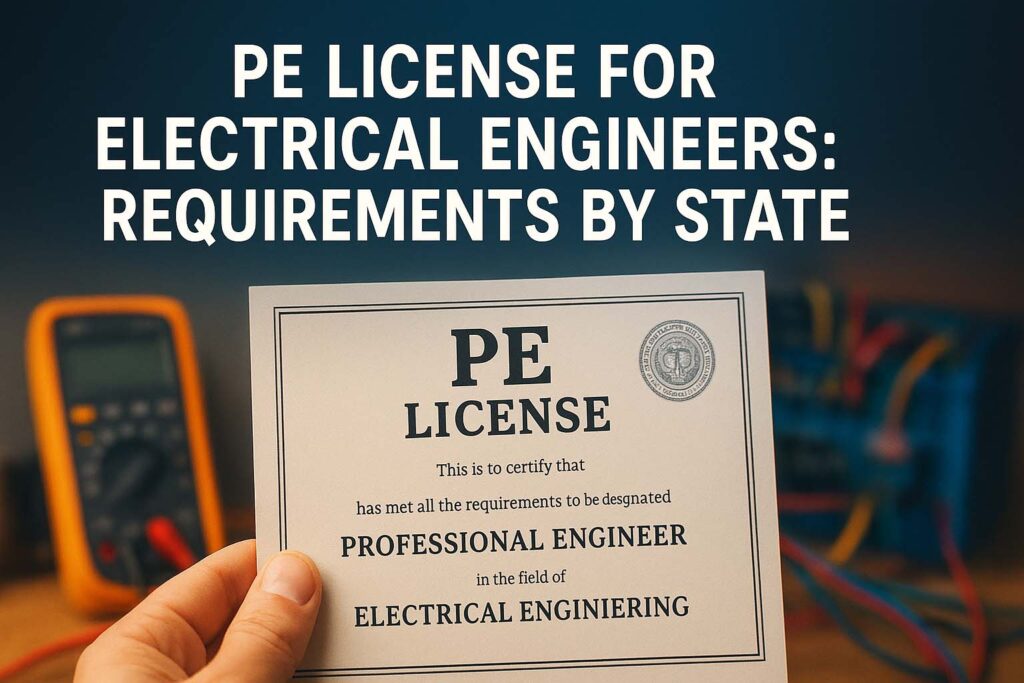PE License for Electrical Engineers: Requirements by State
The PE License for Electrical Engineers is a critical credential for professionals aiming to work on complex electrical systems, sign off engineering documents, or start their own practice. A Professional Engineer (PE) license demonstrates that an engineer has met rigorous standards of competence and ethics. In the United States, licensing is managed at the state level, meaning that requirements can vary significantly from one state to another.
Table of Contents
Table of Contents

Obtaining a PE license is not just about career advancement. It’s often a legal requirement for engineers involved in public safety projects, utility systems, or government contracts. This makes understanding state-specific requirements essential for electrical engineers who want to achieve professional recognition and compliance.
The process generally involves education, experience, and examinations. However, the specific rules for application, experience verification, and renewal differ by state. Knowing these details can help you avoid costly delays and position yourself for success.
Key Takeaways
- A PE License for Electrical Engineers validates technical competency and legal authority to offer engineering services to the public.
- Each state sets its own licensing requirements, renewal timelines, and continuing education obligations.
- The main steps include obtaining an accredited engineering degree, passing the FE and PE exams, and completing supervised experience.
- Some states have additional rules for foreign degrees, ethics exams, or state-specific laws.
Why a PE License for Electrical Engineers Matters
Holding a PE license carries significant benefits. First, it grants you the legal authority to sign and seal engineering documents. This is critical for engineers who want to lead projects or open a consulting firm. Second, it enhances job prospects and salary potential. Employers often prefer or require licensed engineers for senior roles, especially in energy, utilities, and public infrastructure.
In many states, certain projects cannot even begin without a PE’s approval. This includes high-voltage power distribution, electrical system design for public facilities, and compliance-related engineering work. The license demonstrates accountability and adherence to professional standards, which boosts client and public trust.
Another important reason is liability protection. Licensed engineers carry a professional responsibility, which means they can be held accountable for safety and compliance. This responsibility is supported by rigorous licensing rules, ensuring that only qualified professionals take on such roles.
Know more about DEWA Electrical License Guide for Solar Projects in Dubai
General Path to a PE License for Electrical Engineers
While state rules differ, most follow a similar pathway:
Earn an ABET-Accredited Engineering Degree
A bachelor’s degree in electrical engineering from an ABET-accredited program is the standard requirement. Some states allow degrees in related fields, but additional experience may be required.
Pass the Fundamentals of Engineering (FE) Exam
The FE exam, often taken during or soon after college, tests core engineering principles. Passing this exam gives you the title of Engineer-in-Training (EIT) or Engineering Intern (EI).
Gain Supervised Experience
Typically, you need four years of progressive experience under a licensed PE. Some states allow reductions for graduate degrees, while others require exact years of work.
Pass the Principles and Practice of Engineering (PE) Exam
This is a discipline-specific exam that evaluates advanced knowledge and problem-solving in electrical engineering.
Apply for State Licensure
Submit your application, experience records, and fees to the state board. Some states require references from PEs or an ethics test.
Know more about NABCEP Certification for Solar Installers: Process & Cost
PE License for Electrical Engineers: State-Specific Requirements
Below is a comparative summary of PE licensing requirements for key states in the U.S.
| State | Experience Required | Additional Exams | CE Hours / Cycle | Notes |
|---|---|---|---|---|
| Alabama | 4 years | None | 30 hrs / 2 yrs | Ethics course required |
| Alaska | 4 years | State-specific Law Exam | 30 hrs / 2 yrs | |
| Arizona | 4 years | None | 30 hrs / 2 yrs | Self-study allowed |
| Arkansas | 4 years | None | 30 hrs / 2 yrs | |
| California | 4 years | Seismic & Surveying | 30 hrs / 2 yrs | Foreign degrees need evaluation |
| Colorado | 4 years | None | 30 hrs / 2 yrs | |
| Connecticut | 4 years | None | 15 hrs / yr | |
| Delaware | 4 years | Ethics Test | 24 hrs / 2 yrs | |
| Florida | 4 years | None | 18 hrs / 2 yrs | Includes 1 hr Ethics |
| Georgia | 4 years | None | 30 hrs / 2 yrs | |
| Hawaii | 4 years | None | 30 hrs / 2 yrs | |
| Idaho | 4 years | None | 30 hrs / 2 yrs | |
| Illinois | 4 years | None | 30 hrs / 2 yrs | MS degree reduces experience |
| Indiana | 4 years | None | 30 hrs / 2 yrs | |
| Iowa | 4 years | None | 30 hrs / 2 yrs | |
| Kansas | 4 years | None | 30 hrs / 2 yrs | |
| Kentucky | 4 years | None | 30 hrs / 2 yrs | |
| Louisiana | 4 years | State Law & Ethics Exam | 30 hrs / 2 yrs | |
| Maine | 4 years | None | 30 hrs / 2 yrs | |
| Maryland | 4 years | None | 16 hrs / 2 yrs | |
| Massachusetts | 4 years | None | 30 hrs / 2 yrs | |
| Michigan | 4 years | None | 30 hrs / 2 yrs | |
| Minnesota | 4 years | None | 24 hrs / 2 yrs | |
| Mississippi | 4 years | None | 30 hrs / 2 yrs | |
| Missouri | 4 years | None | 30 hrs / 2 yrs | |
| Montana | 4 years | None | 30 hrs / 2 yrs | |
| Nebraska | 4 years | None | 30 hrs / 2 yrs | |
| Nevada | 4 years | State Law Exam | 30 hrs / 2 yrs | |
| New Hampshire | 4 years | None | 30 hrs / 2 yrs | |
| New Jersey | 4 years | Ethics Test | 24 hrs / 2 yrs | |
| New Mexico | 4 years | None | 30 hrs / 2 yrs | |
| New York | 4 years | NY State Law Exam | 36 hrs / 3 yrs | Strict on work experience |
| North Carolina | 4 years | None | 15 hrs / yr | |
| North Dakota | 4 years | None | 30 hrs / 2 yrs | |
| Ohio | 4 years | None | 30 hrs / 2 yrs | |
| Oklahoma | 4 years | None | 30 hrs / 2 yrs | |
| Oregon | 4 years | Law & Ethics Exam | 30 hrs / 2 yrs | |
| Pennsylvania | 4 years | None | 24 hrs / 2 yrs | |
| Rhode Island | 4 years | None | 30 hrs / 2 yrs | |
| South Carolina | 4 years | None | 30 hrs / 2 yrs | |
| South Dakota | 4 years | None | 30 hrs / 2 yrs | |
| Tennessee | 4 years | None | 24 hrs / 2 yrs | |
| Texas | 4 years | Ethics Exam | 15 hrs / yr | Self-study allowed |
| Utah | 4 years | None | 30 hrs / 2 yrs | |
| Vermont | 4 years | None | 30 hrs / 2 yrs | |
| Virginia | 4 years | None | 16 hrs / 2 yrs | |
| Washington | 4 years | State Law Exam | 30 hrs / 2 yrs | |
| West Virginia | 4 years | None | 30 hrs / 2 yrs | |
| Wisconsin | 4 years | None | 30 hrs / 2 yrs | |
| Wyoming | 4 years | None | 30 hrs / 2 yrs |
This table provides an overview, but you should always check your state board’s website for the most updated information.
Know more about How to Get Electrical Certification in USA & Transfer It to Europe
Education Requirements for PE License
Most states require an ABET-accredited bachelor’s degree in electrical engineering. If your degree is from a non-ABET program or a foreign institution, you may need to undergo an NCEES Credentials Evaluation. Some states also require additional coursework in engineering ethics or U.S. engineering laws.
Graduate degrees can sometimes reduce experience requirements by up to one year. For example, Illinois and California allow a master’s degree in engineering to substitute for part of the experience requirement.
Work Experience Details
The experience requirement usually involves four years of progressive work in electrical engineering. Progressive means you must show increasing levels of responsibility over time. Experience must be verified by a PE in most states, though some allow supervisors who are not licensed but can attest to your work.
Certain states require experience specifically related to public safety or design. For instance, work in manufacturing might not fully count if it does not involve engineering judgment. Documentation is crucial—prepare detailed descriptions of your projects and responsibilities when applying.
Know more about Top Trade Schools in USA & Europe Offering High-Paying Electrical Programs
Examination Requirements
The PE License for Electrical Engineers exam is administered by NCEES. It has two primary disciplines:
- Electrical and Computer: Power
- Electrical and Computer: Electronics, Controls, and Communications
The exam lasts 8 hours and includes both multiple-choice and alternative item types. It evaluates real-world application of engineering knowledge.
Several states also mandate additional tests. California, for example, requires seismic and surveying exams even for electrical engineers, while Texas mandates an ethics test.
Continuing Education and License Renewal
Maintaining a PE license involves continuing education (CE). Most states require 15 to 36 Professional Development Hours (PDHs) per renewal period. Some allow online courses, while others demand a mix of live training and ethics coursework.
Here’s a quick comparison of CE requirements:
| State | Hours Required | Ethics Component |
|---|---|---|
| California | 30 hrs/2 years | No |
| Texas | 15 hrs/year | Yes (1 hr) |
| Florida | 18 hrs/2 years | Yes (1 hr) |
| New York | 36 hrs/3 years | Yes (1 hr) |
Failing to meet CE requirements can lead to fines or suspension, so track your hours carefully.
Know more about Electrical Engineering Short Courses That Lead to High-Paying Roles
Cost of Getting a PE License
The total cost varies by state but typically ranges from $500 to $1,200. This includes:
- FE Exam: ~$175
- PE Exam: ~$375
- Application and License Fees: $100–$300
- Additional State Exams: $50–$200
- Continuing Education: ~$300 every renewal cycle
Challenges and Tips for Success
One major challenge is balancing work, study, and life during the licensing process. Start by passing the FE exam early, ideally during college. Maintain detailed records of your projects to simplify experience verification later.
If you hold a foreign degree, begin credential evaluation early, as it can take months. For the PE exam, dedicate at least 3–6 months of study, focusing on NCEES reference materials and sample problems.
Networking with licensed engineers can help, especially when seeking experience under a PE. Many state boards and professional societies like NSPE offer mentoring programs and study groups.
Final Thoughts on PE License for Electrical Engineers
Obtaining a PE License for Electrical Engineers is an investment in your career and professional credibility. While requirements differ across states, the core principles remain the same: education, experience, and examination. Understanding these rules ensures a smoother process and positions you for long-term success in the engineering field.
Follow Us on Social:
Subscribe our Newsletter on Electrical Insights for latest updates from Electrical Engineering Hub
#PELicense, #ElectricalEngineers, #ProfessionalEngineer, #EngineeringLicense, #PEExam, #ElectricalPE, #StateRequirements, #EngineeringCareers, #LicensingGuide, #ElectricalEngineering, #EngineeringJobs, #PECertification, #EngineeringStandards, #EngineerLife, #EngineeringEducation





